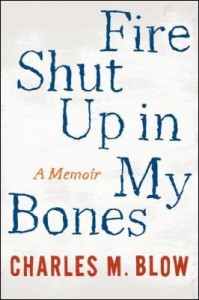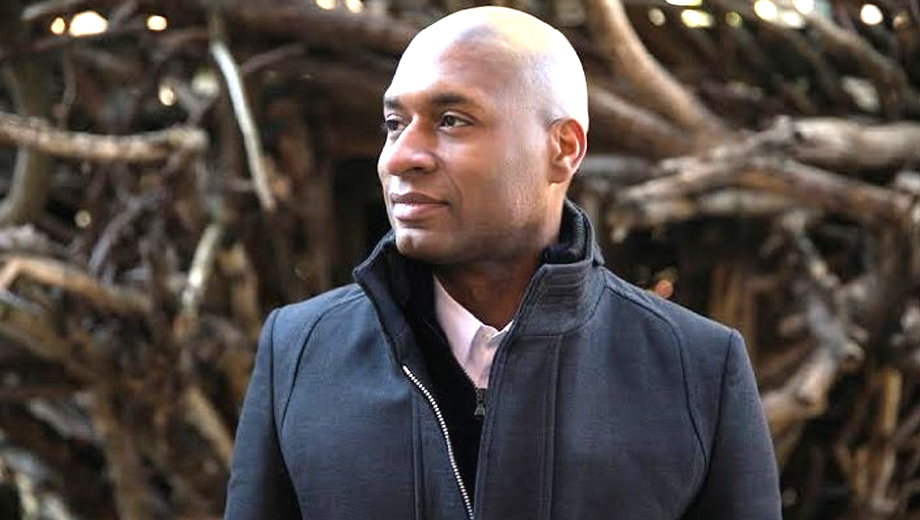 Fire Shut Up in My Bones
Fire Shut Up in My Bones
by Charles Blow
Houghton Mifflin. 240 pages, $27.
The American Dream is not one but rather a kaleidoscope of dreams; this is the rural Southern version. Charles Blow’s life to date can be comfortably divided into two roughly equal parts. The first half, the subject of this memoir, was passed largely “on the black side of town,” in Gibsland, Louisiana—“right in the middle of nowhere”—where, the youngest of five sons, he was raised by a mother of principle and practicality who provided and cared for the family while working for a degree in education and becoming a home economics teacher. His good-for-nothing father was mostly absent after his parents separated when Blow was five. But if mother and sons lived in poverty, they were well off enough to carry themselves with dignity.
The second half of Blow’s life is compressed into the final chapter. Now 44, Blow is an op-ed columnist for The New York Times, famous for weaving survey data with commentary. This part of his life began with hard work and a stroke of luck. The latter occurred at a journalists’ job fair in Atlanta, where he impressed the Times’ representatives with his diligence and determination. He was made a graphics intern, the newspaper’s first, and at the tender age of 24 he was running the graphics department.
That’s quite a distance from the small, informally segregated town of his youth, whose only cemetery had a fence separating black and white graves. With an eye for detail, he paints a vivid portrait of rural poverty in America. Unlike urban poverty, rural poverty is vast and uninterrupted, stretching as wide as the eye can see. Almost everyone was poor, only some were poorer than others. Blow remembers the family house as minimally furnished; food was never thrown away; and the small backyard was used to grow crops. Some nearby relatives lived in houses without running water.
With urban poverty, the sense of deprivation is accentuated by proximity to the city’s riches. In contrast, at least for Blow’s family, scarcity didn’t translate into material craving but instead forged a mentality of self-sufficiency. For example, Blow describes spending “many Saturdays at the city dumps” to find use in what  others threw away, but these memories are surprisingly intertwined with remembrances of family happiness. “Being a child with nothing, it didn’t take much to satisfy me,” he writes. If anything, the hardscrabble existence worked indirectly to suppress this child’s want of attention. A “quiet, introspective boy” who spent lonely afternoons drawing, he did long “to be chosen,” but—keenly aware how much his mother worked and worried—was ashamed to demand attention.
others threw away, but these memories are surprisingly intertwined with remembrances of family happiness. “Being a child with nothing, it didn’t take much to satisfy me,” he writes. If anything, the hardscrabble existence worked indirectly to suppress this child’s want of attention. A “quiet, introspective boy” who spent lonely afternoons drawing, he did long “to be chosen,” but—keenly aware how much his mother worked and worried—was ashamed to demand attention.
The title Fire Shut Up in My Bones is taken from the book of Jeremiah, and the prophet’s next words are: “and I am weary with holding it in, and I cannot.”
When Blow was seven, he was molested by a male cousin. The effect was both immediate and long-lasting: he became gun-shy when around other boys, ever suspicious of people’s intentions. His schoolwork suffered so much that he was placed in a slow class, from which he was rescued by his mother, who simply refused to allow it. Years later, he would be tested as gifted and graduate from high school as valedictorian. He then attended Grambling State University nearby, majoring in journalism.
The incident with his cousin had another importance: it became the uneasy backdrop for Blow’s incipient physical attraction to men. “It was in my mind that I now fused together abuse and attraction,” he writes. In the ensuing years he fought to repress his feelings of homosexual attraction. There were a few bursts of religious enthusiasm; in high school and college some sex with women; in college he joined a fraternity known for its severe hazing. One incident from high school stands out: During a break in a basketball game, Blow crossed the court toward his mother. “Something in my gait” must have alarmed her, he recalls, and “she laid into me in front of everyone. ‘Don’t you run like that!’”
The tone of the book is that of a wise adult who’s able to look back knowingly, albeit empathetically, upon his younger self. As for the adult who emerged from these uncertain beginnings, Blow ended up marrying a woman he met in college, had three children with her, and eventually divorced. He also experimented with men. A description of a traumatic evening in a gay bar illustrates both his burgeoning desires and his lingering inhibitions.
The tone changes when he tries to analyze his sexual identity. “I would come to know what the world called people like me: bisexuals,” he reluctantly concludes. To be sure, the overt homophobia of his youth is long gone; now the social pressure, even in liberal New York, is to decide whether he’s gay or straight. Not given to understatement, he suggests that bisexuals are perceived as “the hated ones. The bastard breed. The ‘tragic mulattos’ of sexual identity.” It’s safe to assume that writing this book was itself part of the effort to address this dilemma.
Yoav Sivan is a New York-based journalist. He maintains a website at www.YoavSivan.com.





